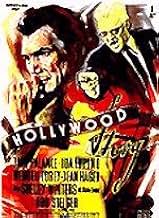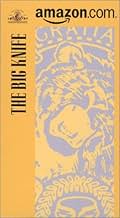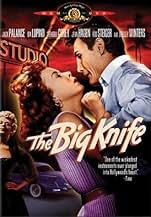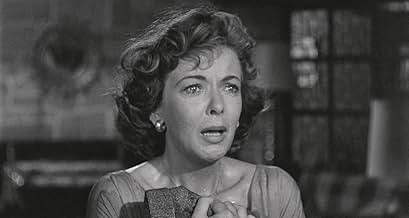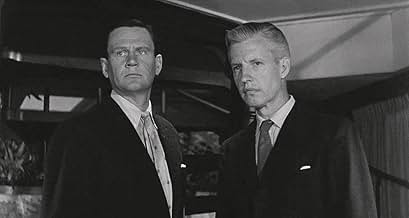CALIFICACIÓN DE IMDb
6.8/10
4.6 k
TU CALIFICACIÓN
Agrega una trama en tu idiomaHollywood actor Charles Castle is pressured by his studio boss into a criminal cover-up to protect his valuable career.Hollywood actor Charles Castle is pressured by his studio boss into a criminal cover-up to protect his valuable career.Hollywood actor Charles Castle is pressured by his studio boss into a criminal cover-up to protect his valuable career.
- Premios
- 1 premio ganado y 2 nominaciones en total
Michael Winkelman
- Billy Castle
- (as Mike Winkelman)
Shelley Winters
- Dixie Evans
- (as Miss Shelley Winters)
Richard Boone
- Narrator
- (voz)
- (sin créditos)
Nick Cravat
- Nick
- (sin créditos)
Robert Emhardt
- Bit Part
- (sin créditos)
Michael Fox
- Prize Fight Announcer
- (sin créditos)
Paula Kyle
- Party Guest
- (sin créditos)
- Dirección
- Guionistas
- Todo el elenco y el equipo
- Producción, taquilla y más en IMDbPro
Opiniones destacadas
"The Big Knife" is really a stage play recorded on film. It's a Hollywood soap opera that features a lot of good actors eating the scenery. Rod Steiger and Everett Sloan are great as the monstrous studio honcho and weaselly agent, respectively. Jack Palance is a competent actor but was woefully miscast as the sensitive, tortured matinée idol -- nobody would ever confuse Palance with a matinée idol. Nevertheless, he does an adequate job.
The power of the studio system in the '50s is well depicted, if a bit overwrought. Steiger's performance is particularly delicious as his toweringly self-centered character cries, wheedles, and intimidates his underlings into doing what he wants.
The movie is showing its age but its excesses, especially its colorful language, are a lot of fun. Recommended, 7 out of 10.
The power of the studio system in the '50s is well depicted, if a bit overwrought. Steiger's performance is particularly delicious as his toweringly self-centered character cries, wheedles, and intimidates his underlings into doing what he wants.
The movie is showing its age but its excesses, especially its colorful language, are a lot of fun. Recommended, 7 out of 10.
One of the 10 best of '55 with sparks flying between Palance & Steiger. Subtle performance by Ms. Ida Lupino and intensity personified by J. Palance. Rod Steiger with white hair and hearing aid is pretty scary. Written by Clifford Odets, this realistic Hollywood tale cuts no corners and does not see out.
An 8 out of 10. Best performance = Rod Steiger. Too grim for some. Beautiful B/W cinematography and terrific script and the entire cast is deliberate and impassioned. I don't believe it was nominated for anything, but should have been. I'm not sure if this is on video or DVD, but check it out!
An 8 out of 10. Best performance = Rod Steiger. Too grim for some. Beautiful B/W cinematography and terrific script and the entire cast is deliberate and impassioned. I don't believe it was nominated for anything, but should have been. I'm not sure if this is on video or DVD, but check it out!
The Big Knife is a mostly good adaptation of a Clifford Odets play about a Hollywood actor who's being blackmailed into studio servitude while trying to patch up his failing marriage. This is a movie for which the word powerful was truly invented. Most of the film takes place on one set and places heavy emphasis on speeches from the individual characters for its really riveting moments (as I would expect from a stage play), but those moments definitely get across. The whole cast is good, but Jack Palance in a nuanced and fiery performance as the actor Charlie Castle, and Rod Steiger, giving a deeply felt and passionate realization of the corrupt studio boss are nothing short of superb. The screenplay is full of smart, incisive, biting dialogue as well. Except for a melodramatic turn at the end, that, for me, takes a lot of the edge off the story, this is a well-acted film that is solid, though not spectacular, entertainment. 3*** out of 4
"The Big Knife" caused a sensation when it came out. After all, no one in his right mind would dare to criticize the movie industry, after all, it was the studio and its ruthless executives that were exposed as the bad guys, even at the time where the old studio system was disappearing.
Clifford Odets wrote the original play, which under Robert Aldrich direction doesn't translate to the screen because it feels claustrophobic in many aspects. The movie treatment was by James Poe, did not make the material come alive because of the theatricality of the source.
Charles Castle, an actor working in Hollywood, is about to commit himself to a renewal of his contract to a major studio. That means another seven years of his life working in whatever pictures the higher ups have in store for him. It couldn't come at a worse time; his wife, Marion, who evidently hasn't a good relation with Charles, is fed up with the idea of staying in Bel Air. Marion pleads with him to give up the movie business so they could have a normal life bringing up their young son.
Castle has had his share of adventures in Hollywood, something that Marion is aware of. In addition to that, he has a dark secret, something that involved a terrible accident for which his publicist has taken the blame and has even serve time in jail. A couple of women are also in the picture, threatening Charles' marriage.
To make matters worse, Charles is visited by the head of the studio, Stanley Hoff, who has brought his assistant, the oily Smiley Coy, to help him convince Castle to sign the contract. Charles Castle is finally defeated at the game as Stanley plays his cards right since he has the upper hand. The result is a bitter loss for the actor, who sees no way out of the situation at hand.
Jack Palance, who, up to this film, had only minor parts, rose to the challenge of playing Charles Castle, who in a way, he had the background, having been a boxer, to play. His work, although a bit unsure, was a revelation to the movie going public at the time. Ida Lupino, an excellent actress, is probably the best thing in the picture. Rod Steiger shows up as the studio head Stanley Hoff, a man that knows well his opponent's weaknesses and uses all in his power to get his way. Wendell Corey, in a small part, also does good work. Jean Hagen and Shelley Winters also contribute to the film.
Ernest Lazlo's cinematography works well, as does the musical score by Frank DeVol. Robert Aldrich, a man with a lot of experience in the business, was a natural choice to undertake the direction of this picture. His only problem was a basic one, how to open the play to cinematic terms.
Clifford Odets wrote the original play, which under Robert Aldrich direction doesn't translate to the screen because it feels claustrophobic in many aspects. The movie treatment was by James Poe, did not make the material come alive because of the theatricality of the source.
Charles Castle, an actor working in Hollywood, is about to commit himself to a renewal of his contract to a major studio. That means another seven years of his life working in whatever pictures the higher ups have in store for him. It couldn't come at a worse time; his wife, Marion, who evidently hasn't a good relation with Charles, is fed up with the idea of staying in Bel Air. Marion pleads with him to give up the movie business so they could have a normal life bringing up their young son.
Castle has had his share of adventures in Hollywood, something that Marion is aware of. In addition to that, he has a dark secret, something that involved a terrible accident for which his publicist has taken the blame and has even serve time in jail. A couple of women are also in the picture, threatening Charles' marriage.
To make matters worse, Charles is visited by the head of the studio, Stanley Hoff, who has brought his assistant, the oily Smiley Coy, to help him convince Castle to sign the contract. Charles Castle is finally defeated at the game as Stanley plays his cards right since he has the upper hand. The result is a bitter loss for the actor, who sees no way out of the situation at hand.
Jack Palance, who, up to this film, had only minor parts, rose to the challenge of playing Charles Castle, who in a way, he had the background, having been a boxer, to play. His work, although a bit unsure, was a revelation to the movie going public at the time. Ida Lupino, an excellent actress, is probably the best thing in the picture. Rod Steiger shows up as the studio head Stanley Hoff, a man that knows well his opponent's weaknesses and uses all in his power to get his way. Wendell Corey, in a small part, also does good work. Jean Hagen and Shelley Winters also contribute to the film.
Ernest Lazlo's cinematography works well, as does the musical score by Frank DeVol. Robert Aldrich, a man with a lot of experience in the business, was a natural choice to undertake the direction of this picture. His only problem was a basic one, how to open the play to cinematic terms.
Unless you understand that The Big Knife was Clifford Odets's one finger salute to Hollywood and its mores, you will not understand the film at all. Odets after some bad times in tinseltown went back to his first love which was the theater and wrote this play which ran for 109 performances in the 1949 season on Broadway.
In the lead roles of actor Charlie Castle and producer Marcus Hoff, Odets cast a couple of guys who were having difficulty finding employment in Hollywood at that time as well, kindred spirits from the Group Theater back in the day, John Garfield and J. Edward Bromberg. Garfield who certainly could bring his own life into the part plays Odets himself who had as tempestuous personal life as his creation Charlie Castle. He feels starved creatively because of the junk he's been doing in Hollywood, not the stuff of social significance that Odets did back Group Theater days.
Jack Palance plays Castle in the film and while he does justice to the part I only wish John Garfield had lived to do the screen version of what he created. He had an unceasing rebellion against Warner Brothers for the stereotypical tough guys parts he was being cast in. But just after he broke free came the blacklist.
Rod Steiger is malevolence itself as the producer whom I believe was based on Louis B. Mayer. Odets dealt with him through his then wife Luise Rainer over at MGM. Mayer was not liked even by his fellow studio moguls and he had been toppled in a studio power play at MGM a few years earlier. Had he still been in charge at MGM, I'm willing to bet The Big Knife might never have been made even as an independent film with a United Artists release.
Director Robert Aldrich filled out the rest of the cast with familiar Hollywood names like Ida Lupino as Palance's estranged wife, Everett Sloane as his long suffering agent, Wendell Corey in a role that has to be modeled on MGM's fixer who knew where all the bodies were buried Eddie Mannix, Shelley Winters as the bimbo like starlet who can put an end to Palance's career and Ilka Chase as a Hedda Hopper like columnist who is the self appointed keeper of the Hollywood morals. Chase's scenes are at the beginning of the film and she really has the columnist character dead on.
On stage the entire play is set in the living room of the Palance/Lupino Hollywood style mansion. Like the house in Long Day's Journey Into Night, the opulent living room becomes a character itself, showing the velvet and comfortable trap that Palance is in and why he just can't give up all this comfort, even for the art that used to motivate him.
Odets might have done better had someone else a little more dispassionate had written this based on his memoirs. The Big Knife gets a little too personal at times. And it never quite loses the stage origin even with a few scenes away from the house. But the acting his first rate from a first rate cast. I'd watch The Big Knife as a look into the mind of Clifford Odets.
In the lead roles of actor Charlie Castle and producer Marcus Hoff, Odets cast a couple of guys who were having difficulty finding employment in Hollywood at that time as well, kindred spirits from the Group Theater back in the day, John Garfield and J. Edward Bromberg. Garfield who certainly could bring his own life into the part plays Odets himself who had as tempestuous personal life as his creation Charlie Castle. He feels starved creatively because of the junk he's been doing in Hollywood, not the stuff of social significance that Odets did back Group Theater days.
Jack Palance plays Castle in the film and while he does justice to the part I only wish John Garfield had lived to do the screen version of what he created. He had an unceasing rebellion against Warner Brothers for the stereotypical tough guys parts he was being cast in. But just after he broke free came the blacklist.
Rod Steiger is malevolence itself as the producer whom I believe was based on Louis B. Mayer. Odets dealt with him through his then wife Luise Rainer over at MGM. Mayer was not liked even by his fellow studio moguls and he had been toppled in a studio power play at MGM a few years earlier. Had he still been in charge at MGM, I'm willing to bet The Big Knife might never have been made even as an independent film with a United Artists release.
Director Robert Aldrich filled out the rest of the cast with familiar Hollywood names like Ida Lupino as Palance's estranged wife, Everett Sloane as his long suffering agent, Wendell Corey in a role that has to be modeled on MGM's fixer who knew where all the bodies were buried Eddie Mannix, Shelley Winters as the bimbo like starlet who can put an end to Palance's career and Ilka Chase as a Hedda Hopper like columnist who is the self appointed keeper of the Hollywood morals. Chase's scenes are at the beginning of the film and she really has the columnist character dead on.
On stage the entire play is set in the living room of the Palance/Lupino Hollywood style mansion. Like the house in Long Day's Journey Into Night, the opulent living room becomes a character itself, showing the velvet and comfortable trap that Palance is in and why he just can't give up all this comfort, even for the art that used to motivate him.
Odets might have done better had someone else a little more dispassionate had written this based on his memoirs. The Big Knife gets a little too personal at times. And it never quite loses the stage origin even with a few scenes away from the house. But the acting his first rate from a first rate cast. I'd watch The Big Knife as a look into the mind of Clifford Odets.
¿Sabías que…?
- TriviaBecause of its vitriolic take on Tinseltown, this was unsurprisingly turned down by all the major studios in Hollywood. It eventually found a home at United Artists.
- ErroresThe camera and operator are visibly reflected in one scene in the living room.
- Citas
Smiley Coy: A woman with six martinis can ruin a city.
- Créditos curiososIn the opening credits: Upholstered furniture by Martin/ Brattrud.
- ConexionesFeatured in Les dossiers de l'écran: Les coulisses du cinéma (1970)
Selecciones populares
Inicia sesión para calificar y agrega a la lista de videos para obtener recomendaciones personalizadas
- How long is The Big Knife?Con tecnología de Alexa
Detalles
- Fecha de lanzamiento
- País de origen
- Idioma
- También se conoce como
- Hollywood-Story
- Locaciones de filmación
- Productora
- Ver más créditos de la compañía en IMDbPro
Taquilla
- Presupuesto
- USD 423,000 (estimado)
- Tiempo de ejecución1 hora 51 minutos
- Color
- Relación de aspecto
- 1.85 : 1
Contribuir a esta página
Sugiere una edición o agrega el contenido que falta

Principales brechas de datos
By what name was The Big Knife (1955) officially released in India in English?
Responda

